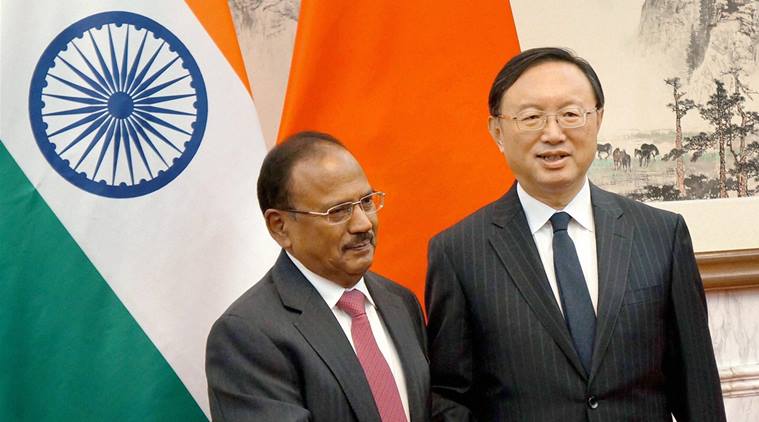The Dragon Fumes as India Facilitates a Chinese Dissidents Conference at Dharamsala

NEW DELHI: In tit for tat diplomacy that is fraught with dangerous portent, India has given clearance for Chinese dissidents to participate in a meeting at Dharamsala in Himachal Pradesh on April 28. The news that is creating waves in India-Pakistan relations but has not been picked up seriously by the Indian media, suggests that a Uyghur leader Dolkun Isa, branded a ‘terrorist’ by China, will also be attending the three day meet that will be addressed by the Dalai Lama.
The conference comes in the wake of China’s move to block the Indian proposal for a UN sanction on Jaish-e-Mohammad chief Mohammad Azhar. Despite protests by India at different levels, Beijing has been adamant that the proposal must remain on ‘technical hold’---described as a ‘hidden veto’ by New Delhi---until India submits more evidence.
India has been facilitating the conference, clearing visas regardless of China’s stern warnings. Isa who is chairperson of the executive committee of the World Uyghur Congress and settled in Munich, has confirmed being given a visa by the Indian government. He is a controversial delegate, as China has a Red Corner Interpol Notice out for him and in a statement to sections of the media has stated categorically, “Dolkun Isa is a terrorist on the red notice of Interpol and the Chinese police. Bringing him to justice is a due obligation of relevant countries”.
Isa has responded to this on his Facebook with, “ what is a stupid blames! everybody knows that i am very peaceful activist! Actually, world is witness that CCP is biggest terrorist gang in the world.”
This is the first time that the World Uyghur Congress is being invited for a meeting in Delhi, and while it will be represented Isa’s own presence is subject to the security cover provided to him by the Indian government, given the Interpol notice. Needless to say such an assurance from New Delhi will lead to a direct spat with China that will open a Pandora’s Box for both countries. For Beijing he remains a terrorist and the “vice-president of separatist East Turkestan Liberation Organisation”. He denies any links with this organisation. And is optimistic that India will speak for the “Uyghurs’ non-violent struggle for political and religious freedom, democracy and human rights.”
Interestingly, while New Delhi is facilitating the event, it is being organised here by a US based Citizen Power for China under the title “Strengthening Our Alliance to Advance the Peoples’ Dream: Freedom, Justice, Equality and Peace”. This organisation, also known as Initiatives for China, is led by another Chinese dissident Yang Jianli who is described as a 1989 “Tiananmen Square activist”. He pursued his higher education in the US, has been jailed in China, and is taking the lead in bringing a host of Chinese dissident delegates to India for the conference.
India had agreed not to allow political activities when giving sanctuary to the Dalai Lama. This agreement with China has been largely observed, although demonstrations for a free Tibet in parts of India have always drawn a protest from Beijing. This dissidents meeting, however, has crossed the line and although officially the Chinese Foreign Office has denied knowledge of it for the moment, the spokesperson has reiterated its position on Isa, reminding the world---and clearly in this case India---that it expects its position on him and other dissidents to be respected.
The meeting follows three high level interactions between China and India that have clearly not been able to paper over the differences following the former’s veto on Azhar. China remained adamant about its position despite pressure exerted by two Ministers and the National Security Advisor. On April 16, Defence Minister Manohar Parrikar visited China for five days and raised the issue. On April 18, External Affairs Minister Sushma Swaraj met the Russian and Chinese foreign ministers and warned against double standards on terrorism. She also had a bilateral meeting with China’s minister Wang Yi where the issue was again raised.
On April 20, Indian National Security Advisor Ajit Doval visited Beijing to attend the 19th Special Representatives’ Meeting on the China-India Boundary Question with Chinese State Councilor Yang Jiechi. China’s decision to block the sanctions against Azhar was discussed as well. As a former diplomat pointed out, “this will certainly turn the clock back for India-China relations, to what extent we will have to wait and see.”
China’s response as articulated by the Chinese Foreign Ministry spokesperson Hua Chunying remained, "As for the listing matter China has already expressed its position. We support the UN central coordinating role in the world campaign against terrorism and China has taken active part in the world cooperation against terrorism.We oppose double standards in counter terrorism campaign. We have been dealing with the listing matter in accordance with the facts and relevant resolutions. We are also in sound communication with all relevant parties including the Indian side.”
The ‘sound communication” has not prevented New Delhi from showcasing Chinese dissidents on Indian territory. Experts said that this conference could well turn the tide of India-China relations as Beijing is not expected to sit back and accept what is a major political activity directed against China.



